Balbharti Maharashtra State Board Class 12 History Important Questions Chapter 2 European Colonialism Important Questions and Answers.
Maharashtra State Board 12th History Important Questions Chapter 2 European Colonialism
1A. Choose the correct alternative and rewrite the statement.
Question 1.
__________ was a result of Industrial Revolution.
(a) Communism
(b) Colonialism
(c) Capitalism
(d) Imperialism
Answer:
(b) Colonialism
Question 2.
The King of __________ was the supreme authority.
(a) England
(b) Portugal
(c) Russia
(d) Spain
Answer:
(d) Spain
![]()
Question 3.
In 1496, __________ was granted permission to establish colonies on American land.
(a) John Abbot
(b) George Washington
(c) Thomas Jefferson
(d) Ferdinand Magellan
Answer:
(a) John Abbot
Question 4.
The Boston Tea Party took place in the year __________
(a) 1771
(b) 1772
(c) 1773
(d) 1774
Answer:
(c) 1773
Question 5.
__________ was earlier known as ‘Brahmadesh’ (Burma).
(a) Cambodia
(b) Vietnam
(c) Thailand
(d) Myanmar
Answer:
(d) Myanmar
Question 6.
The __________ war was fought in the year 1885 C.E.
(a) Third Anglo-Burmese war
(b) Second Anglo-Burmese war
(c) First Anglo Burmese war
(d) Anglo-Nepalese war
Answer:
(a) Third Anglo-Burmese war
![]()
Question 7.
The British imprisoned __________ after his defeat.
(a) George Washington
(b) King Thibaw
(c) Thomas Jefferson
(d) John
Answer:
(b) King Thibaw
Question 8.
__________ is the capital of Tibet.
(a) Leh
(b) Ladakh
(c) Lhasa
(d) Laos
Answer:
(c) Lhasa
1B. Find the incorrect pair from group ‘B’ and write the corrected one.
Question 1.
| Group ‘A’ | Group ‘B’ |
| (a) The Boston Tea Party | 1770 |
| (b) Declaration of Independence | 1774 |
| (c) The Stamp Act | 1765 |
| (d) American Independence | 1780 |
Answer:
The Boston Tea Party – 1773
Question 2.
| Group ‘A’ | Group ‘B’ |
| (a) Queen of England | Queen Elizabeth I |
| (b) King of Myanmar | King Thibaw |
| (c) King of Belgium | Louis XVI |
| (d) Chancellor of Germany | Bismarck |
Answer:
King of Belgium – Leopold II
2A. Write the names of historical places/persons/events.
Question 1.
The people of Asia and Africa were economically exploited by the-
Answer:
Europeans
Question 2.
In 1607 the British built a colony on the banks of the river ‘James’-
Answer:
Jamestown
![]()
Question 3.
The country which was earlier known as ‘Brahmadesh’-
Answer:
Myanmar
Question 4.
Governor-General of India who declared war against Myanmar-
Answer:
Lord Amherst
Question 5.
The American revolt of independence is also known as-
Answer:
American Revolution
Question 6.
The book written by Lokmanya Tilak in Mandalay jail-
Answer:
Geetarahasva
Question 7.
Venue of the geographical conference in 1876-
Answer:
Brussels
![]()
Question 8.
The Chancellor of Germany who established the first German colony in West Africa in 1883-
Answer:
Bismarck
2B. Choose the correct reason from those given below and complete the sentence.
Question 1.
The American colonies declared boycott on British goods because __________
(a) restrictions were imposed on them and autonomy
(b) British goods were of poor quality
(c) heavy taxes were levied on British goods
(d) American goods were of superior quality
Answer:
(a) restrictions were imposed on them and autonomy.
Question 2.
The British imprisoned King Thibaw because __________
(a) he was an outlaw
(b) he refused to obey the British
(c) he was a cruel king
(d) the British wanted to ensure that he would not be able to rise against the British or have any contact with his subjects
Answer:
(d) the British wanted to ensure that he would not be able to rise against the British or have any contact with his subjects.
Question 3.
The British wanted to bring Bhutan under their control because __________
(a) Bhutan was a beautiful country
(b) Bhutan was a rich kingdom
(c) Bhutan helped to open the trade route from Bengal to Tibet for the British
(d) Bhutan was militarily weak
Answer:
(c) Bhutan helped to open the trade route from Bengal to Tibet for the British.
![]()
Question 4.
Sudan was important for England because __________
(a) the Nile, the lifeline of Egypt originates in Sudan
(b) Sudan was rich in minerals
(c) Sudan had a strong army
(d) England had an ulterior motive
Answer:
(a) the Nile, the lifeline of Egypt originates in Sudan.
3A. Observe the map on textbook page 12 and answer the questions based on it.
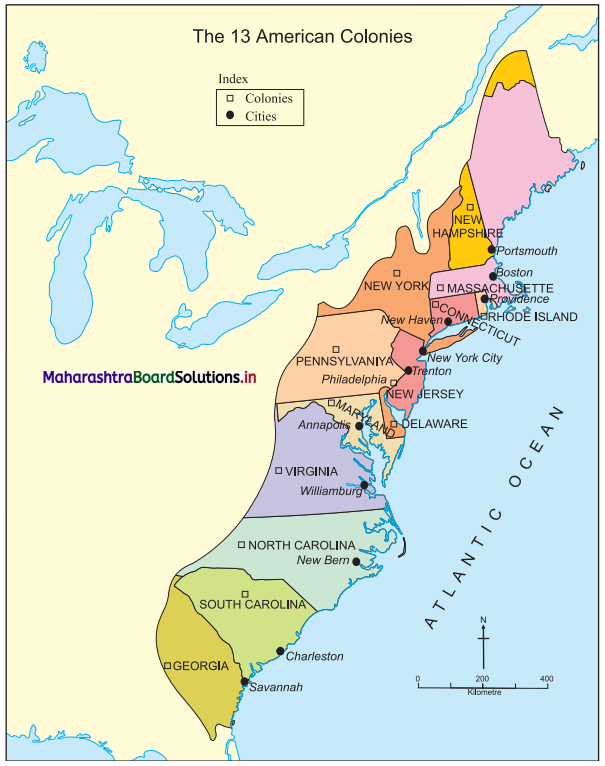
Question 1.
Write the names of the thirteen colonies.
Answer:
New Hampshire, New York, Massachusetts, Connecticut, Rhode Island, Pennsylvania, New Jersey, Delaware, Maryland, Virginia, North Carolina, South Carolina, and Georgia.
Question 2.
Name some of the cities in the colonies.
Answer:
Portsmouth, Boston, New York City, Trenton, etc.
Question 3.
What is the name of the ocean that lies to the east of the colonies?
Answer:
The Atlantic Ocean lies to the east of the colonies.
3B. Complete the following concept map.
Question 1.
| Important Events | Dates |
| The Stamp Act | …………………….. |
| ……………………….. | 1773 |
| Declaration of Independence | ……………………… |
| ………………………. | 1780 |
Answer:
| Important Events | Dates |
| The Stamp Act | 1765 |
| The Boston Tea Party | 1773 |
| Declaration of Independence | 1774 |
| American Independence | 1780 |
Question 2.
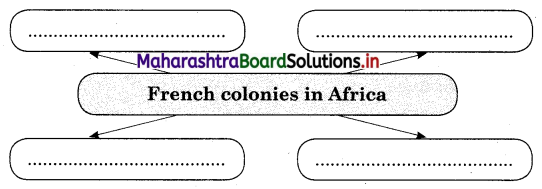
Answer:
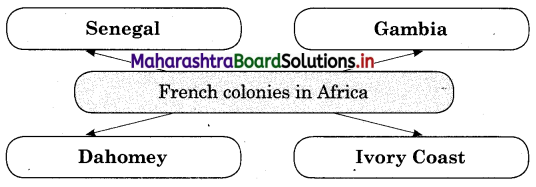
Question 3.
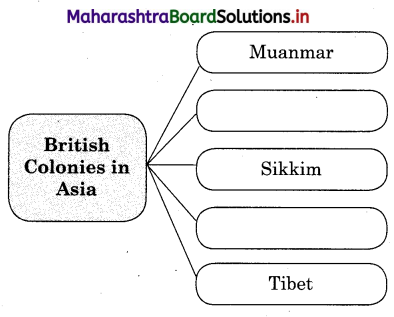
Answer:
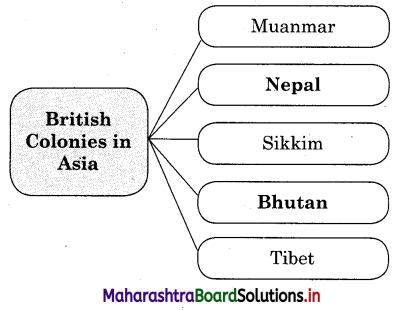
4A. Write short notes.
Question 1.
The Stamp Act (1765).
Answer:
- The Stamp Act was passed in the year 1765. This act made it obligatory to purchase special stamps for important documents.
- British colonies in America like Virginia, Massachusetts put up resistance against the Stamp Act and also other restrictions on the colonies.
![]()
Question 2.
The Boston Tea Party (1773).
Answer:
- The British Parliament had granted a monopoly to the East India Company to import and sell tea to the colonies.
- People in the colonies were demanded the removal of restrictions imposed on them and autonomy. The British Government refused to yield to the demands of the colonies and in retaliation America decided to boycott British goods.
- In 1773, as an act of resistance, the local residents of Boston dumped the boxes of tea in the sea belonging to the East India Company. This event is known as the ‘Boston Tea Party.’
Question 3.
‘Declaration of Independence (1774).
Answer:
Thirteen colonies in America came together and declared independence from Great Britain. On 4th July in the meeting known as the ‘Second Continental Congress,’ a document is known as the ‘Declaration of Independence was adopted. This document was drafted by Thomas Jefferson. The crucial part of this document announced that the 13 American colonies were independent sovereign states. The key point of this document is the statement about three basic human rights namely ‘Life, Liberty, and Pursuit of Happiness. It was stated that these three are the natural rights of all humans which nobody can be deprived of.
4B. Explain the following statements with reasons.
Question 1.
Sudan was important for England.
Answer:
Sudan was a vassal state of England. Sudan was important for England because the Nile which was the lifeline of Egypt originates in Sudan. England without paying heed to local opposition established its supremacy over Sudan. To facilitate the moving of the British army in Sudan, the British began to build a railway track from Uganda to Sudan.
5. State your opinion.
Question 1.
The Boston Tea party took place in 1773.
Answer:
- The British Parliament had granted a monopoly to the East India Company to import and sell tea to the colonies.
- People in the colonies were demanded the removal of restrictions imposed on them and autonomy. The British Government refused to yield to the demands of the colonies and in retaliation America decided to boycott British goods.
- In 1773, as an act of resistance, the local residents of Boston dumped the boxes of tea in the sea belonging to the East India Company. This event is known as the ‘Boston Tea Party.’
Question 2.
‘Declaration of Independence was adopted.
Answer:
Thirteen colonies in America came together and declared independence from Great Britain. On 4th July in the meeting known as the ‘Second Continental Congress’ a document known as ‘Declaration of Independence was adopted. This document was drafted by Thomas Jefferson. The crucial part of this document announced that the 13 American colonies were independent sovereign states. The key point of this document is the statement about three basic human rights namely ‘Life, Liberty, and Pursuit of Happiness. It was stated that these three are the natural rights of all humans which nobody can be deprived of.
![]()
Question 3.
The British imprisoned King Thibaw of Myanmar.
Answer:
King Thibaw of Myanmar tried to strike a pact with Italy and Germany. These reasons were enough for the British to feel alarmed. They declared war against King Thibaw when he levied a fine on the Bombay-Burma Trading Corporation, a British company. This led to a war being declared against Burma. King Thibaw surrendered and was imprisoned by the British to ensure that he would not be able to rise against the British or have any contact with his subjects.
Question 4.
The First Anglo-Burmese War was fought.
Answer:
Burma was rich in natural wealth and was also a potential market. The royal dynasty had successfully consolidated the country under their rule. It conquered Manipur in 1813 and in 1822 they attacked Assam. The British were alarmed by these attacks. Hence, Lord Amherst, the Governor-General of India declared war against Myanmar. The war continued for two years. This was the First Anglo-Burmese War. The British navy conquered the port of Rangoon (Yangon) in this war. This war ended with a treaty between the British and the Burmese king.
6. Answer the following questions in detail.
Question 1.
Write a note on England’s role in Australia.
Answer:
- England first colonised Australia in the 18th century when the first colony of prisoners was deported from England.
- Later in the 19th century, other regions in Australia were colonised.
- The British also established their colonies in the island of Tasmania and New Zealand.
- In the year 1900, the island of Tasmania and the Republic of Australia was created as an integral nation of the British Empire.
- A bicameral parliament was established and a Governor-General was appointed in Australia by the British king as the viceregal representative.
- Only European immigrants were allowed to enter Australia.
Question 2.
Explain Britain’s interest in conquering Tibet.
Answer:
- Tibet was under the influence of the Dalai Lama.
- The British wanted to gain control over Tibet by arresting Russian advances and increase their own trade.
- The British military had reached Lhasa, the capital of Tibet.
- In 1907 as per the treaty between England and Russia, China’s political rule in Tibet was acknowledged.
- It gave leeway to China to claim Tibet as an integral part of China.
![]()
Question 3.
Discuss the consequences of Colonialism.
Answer:
The people in Asia and Africa were economically exploited by the Europeans. People in the colonies lost their independence. Their economic exploitation pushed them into poverty. A new awareness emerged in the political, social, economic, and educational fields. Common people became conscious of democratic systems and their inherent modern values like liberty, equality, and fraternity. People were introduced to principles like administration based on a fundamental legal system, judicial system, availability of education to all.
7. Answer the following question with the help of the given points.
Question 1.
Explain the causes for the rise of Colonialism.
(a) Industrial Consequences
(b) Requirements of Raw Material
(c) Sources of Minerals
(d) Feeling of Racial Superiority
Answer:
(a) Industrial Consequences:
Colonialism was a result of the industrial revolution. Production increased enormously because of the new machines. However, the rate of local consumption was much less compared to the surplus rate of production. Hence, the immediate need of the Europeans was to find new markets for selling their products. It was also necessary that these markets be dependable and easy to dominate.
(b) Requirements of Raw Material:
The desire to create a monopoly in the market and the need to procure raw material at cheaper rates were two major factors that made European nations compete with one another for clear Supremacy.
(c) Sources of Minerals:
The countries in Asia and Africa were rich in minerals like gold, diamonds, silver, coal, etc. This attracted the European nations to Asia and Africa.
(d) Feeling of Racial Superiority:
The Europeans felt it was their responsibility to civilise the people of Asia and Africa. This led to the conversion of Asian and African people to Christianity. It also helped the growth of colonialism.
Question 2.
Write a note on the events that led to the American Revolution.
(a) The Stamp Act of 1765
(b) The Boston Tea Party of 1773
(c) Declaration of Independence in 1774
(d) War at Saratoga
Answer:
(a) The Stamp Act (1765):
- The Stamp Act was passed in the year 1765. This act made it obligatory to purchase special stamps for important documents.
- British colonies in America like Virginia, Massachusetts put up resistance against the Stamp Act and also other restrictions on the colonies.
![]()
(b) The Boston Tea Party (1773):
- The British Parliament had granted a monopoly to the East India Company to import and sell tea to the colonies.
- People in the colonies were demanded the removal of restrictions imposed on them and autonomy. The British Government refused to yield to the demands of the colonies and in retaliation America decided to boycott British goods.
- In 1773, as an act of resistance, the local residents of Boston dumped the boxes of tea in the sea belonging to the East India Company. This event is known as the ‘Boston Tea Party.’
(c) ‘Declaration of Independence (1774):
Thirteen colonies in America came together and declared independence from Great Britain. On 4th July in the meeting known as the ‘Second Continental Congress,’ a document is known as ‘Declaration of Independence was adopted. This document was drafted by Thomas Jefferson. The crucial part of this document announced that the 13 American colonies were independent sovereign states. The key point of this document is the statement about three basic human rights namely ‘Life, Liberty, and Pursuit of Happiness. It was stated that these three are the natural rights of all humans which nobody can be deprived of.
(d) American War of Independence:
The colonies got into several battles with the British army even after gaining independence. The colonies finally at Saratoga got a decisive victory over the British army. This victory proved to be a turning point for the colonies as the French agreed to support them in their conflict against the British. Eventually, Spain also joined the conflicts in their struggle for independence.
![]()
On 7th October 1780, George Washington defeated the British army. On 19th October, British General Lord Cornwallis surrendered and America became independent. The American revolt for independence is also known as the ‘American Revolution’. America proved to the world that the subjects have a right to fight their rulers who deny them their natural rights.